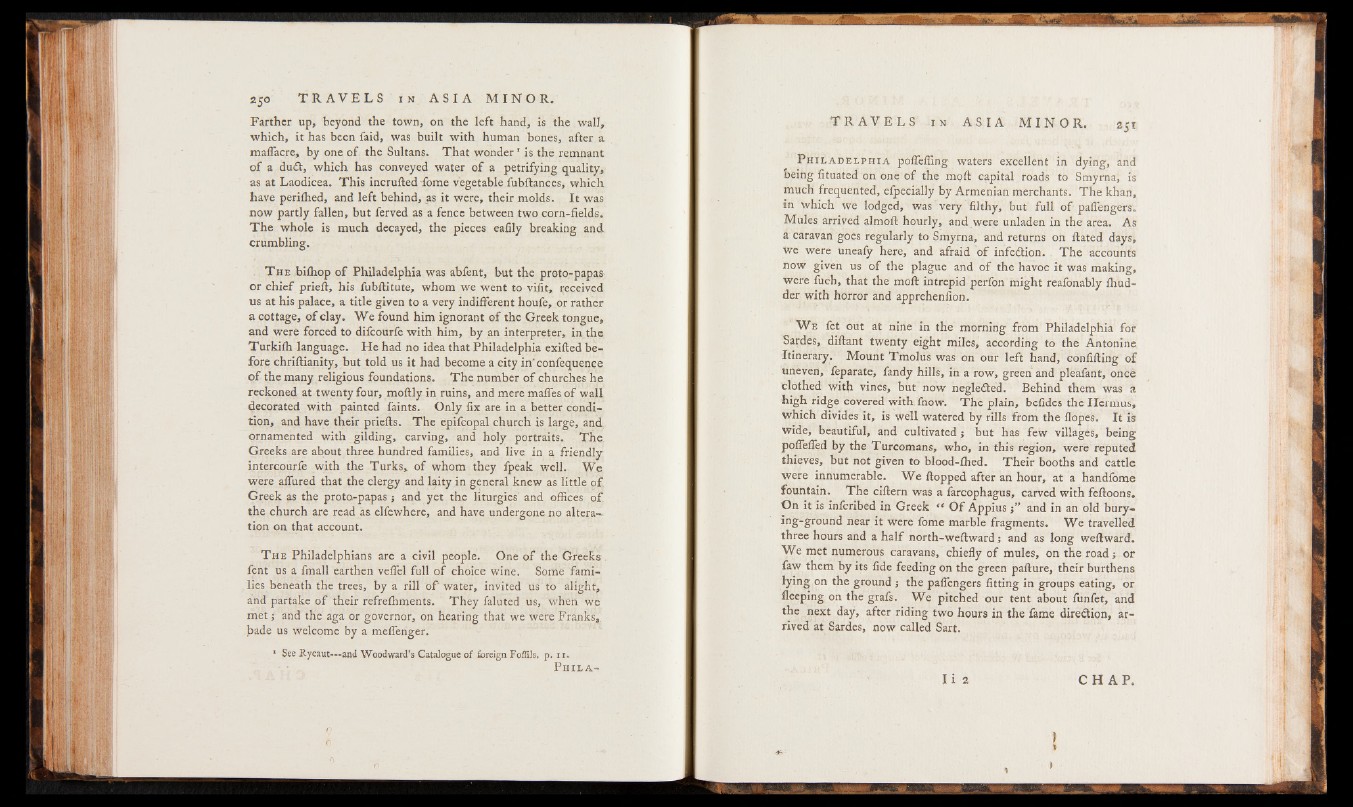
Farther up, beyond the town, on the left hand, is the wall,
which, it has been faid, was built with human bones, after a
maflacre, by one of the Sultans. That wonder' is the remnant
of a dud:, which has conveyed water of a petrifying quality,
as at Laodicea. This incrufted fome vegetable fubftances, which
have perifhed, and left behind, as it were, their molds. It was
now partly fallen, but ferved as a fence between two corn-fields.
The whole is much decayed, the pieces eafily breaking and.
crumbling.
T he bifhop of Philadelphia was abfent, but the proto-papas
or chief prieft, his fubftitute, whom we went to vifit, received
us at his palace, a title given to a very indifferent houfe, or rather
a cottage, of clay. We found him ignorant of the Greek tongue,
and were forced to difeourfe with him, by an interpreter, in the
Turkifh language. He had no idea that Philadelphia exifted before
chriftianity, but told us it had become a city in'confequenee
of the many religious foundations. The number of churches he
reckoned at twenty four, moftly in ruins, and mere maffes o f wall
decorated with painted faints. Only fix are in a better condition,
and have their priefts. The epifcopal church is large, and
ornamented with gilding, carving, and holy portraits. The.
Greeks are about three hundred families, and live in a friendly
intercourfe with the Turks, of whom they ipeak well. We
were affured that the clergy and laity in general knew as little of
Greek as the proto-papas \ and yet the liturgies' and offices of
the church are read as elfewhere, and have undergone no alteration
on that account.
T he Philadelphians are a civil people. One of the Greeks .
fent us a fmall earthen veflel full of choice wine. Some families
beneath the trees, by a rill of" water, invited Us to alight,
and partake of their refrefhments. They faluted us, when we
met; and the aga or governor, on hearing that we were Franks,
bade us welcome by a meffenger. 1
1 See Rycaut— and Woodward’s Catalogue o f foreign Foflils, p. n .
P h i l a i
P hiladelphia poflefiing waters excellent in dying, and
being fituated on one of the mQft capital roads to Smyrna, is
much frequented, efpecially by Armenian merchants. The khan,
in which we lodged, was very filthy, but full of paifengers.
Mules arrived almoft hourly, and were unladen in the area. As
a caravan goes regularly to Smyrna, and returns on ftated days,
we were unealy here, and afraid of infection. The accounts
now given us of the plague and of the havoc it was making,
were fuch, that the moll intrepid perfon might reafonably fhud-
der with horror and apprehenfion.
W e fet out at nine in the morning from Philadelphia for
Sardes, diftant twenty eight miles, according to the Antonine
Itinerary. Mount Tmolus was on our left hand, confifting of
uneven, feparate, fandy hills, in a row, green and pleafant, once
clothed with vines, but now neglefted. Behind them was a
high ridge covered with fnow. The plain, befides the Hermus,
which divides it, is well watered by rills from the Hopes. It is
wide, beautiful, and cultivated; but has few villages, being
polfeifed by the Turcomans, who, in this region, were reputed
thieves, but not given to blood-lhed. Their booths and cattle
were innumerable. We flopped after an hour, at a handlome
fountain. The ciftern was a farcophagus, carved with feftoons.
On it is inferibed in Greek “ O f Appius j” and in an old bury-
ing-ground near it were fome marble fragments. We travelled
three hours and a half north-weftward j and as long weftward.
We met numerous caravans, chiefly of mules, on the road; or
faw them by its fide feeding on the green pafture, their burthens
lying on the ground j the paifengers fitting in groups eating, or
fleeping on the grafs. We pitched our tent about funfet, and
the next day, after riding two hours in the fame direction, arrived
at Sardes, now called Sart.
I i 2 C H A P .
)
> »